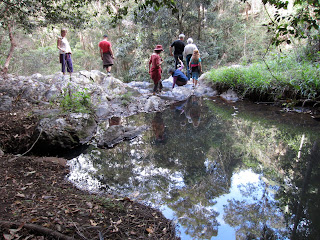Aunt Dorothy
Three weeks ago I visited my 94 year old Aunt Dorothy in a nursing home in Canberra. She is my father’s older sister - ten years older than him, though Dad has been gone almost forty years now. God, these numbers make my head spin.
Dorothy and her diplomat husband Noel were a glamorous though mostly absent fixture throughout my childhood. They and my two older cousins lived an unimaginably sophisticated overseas life of cocktail parties and sea voyages and servants in white jackets.
All this, while we mere Antipodean mortals washed the car, and mowed the lawn on Saturday afternoon in a dull outer suburb of Melbourne. Watched the footy up at the oval, couldn’t wait till the new Myer shopping complex was finished, down by Ringwood station.
Every year or so they would return from their posting in Paris and join us for Christmas. My brother and I would be given gifts of children’s books in French, which we couldn’t read, but treasured nonetheless. I still have “Pistache et Dame Tartine” and also a book of 60’s black-and-white photos of Paris which they gave my parents. Paris was the only place you’d really want to live.
Both Dorothy and Noel were over six feet tall. They could quote poetry in several languages and looked surprised - and yes, a little shocked, but too polite to mention it - when at thirteen I couldn’t understand Dante or Rimbaud or Shakespeare, or even complete a quote from Wordsworth... The frisson of disapproval communicated by D with a certain narrowing of eyes, a twitch of eyebrow. As a teenager I felt irritable and inadequate around them. Who cared about stupid poetry and foreign languages?
My parents went into party-mode when Dorothy and Noel were around There would be epic dramas in the kitchen over elaborate recipes from Mastering The Art Of French Cooking. Much alcohol was consumed, there was late-night singing of old Anglican hymns. Revisiting of highly amusing stories featuring themselves and all their charming little foibles. Just entre nous. Everyone adored everyone else.
My parents visited Dorothy and Noel in Paris in the mid-sixties, and had a famous holiday with them in Italy. In the early seventies, they were posted to Tehran and Uncle Noel met the Shah Of Iran. Their life was even more glamorous and exotic than in Paris. A chauffeur, A cook called Hadjii. Men in white navel jackets with gold epaulets and blue sashes. Women in evening gowns.
Old Kodachrome slides (where are they now?) show my suntanned parents lounging by the pool in Tehran with a hovering waiter and a desert backdrop. My sophisticated cousin in a green bikini.
Thinking about it now, I feel a little miffed at their willingness to leave us kids at home when they went off on these jaunts. The Iran trip was to be my father’s last - he died just a few months later, before the Persian rugs they’d bought in Isfahan had even arrived in Melbourne.
And of course that time now has the romantic aura of having been the final moment of an lost era - The Ayatollah was about to sweep away all the glitter and privilege that Westerners like my aunt and uncle revelled in.
After Tehran, they were posted to Rome. And finally, I got to visit them. We had Christmas there in 1973, my brother and mother and I. It was a year after Dad’s death. I was eighteen and it was my first taste of travel, and of Europe. After Mum and bro. went home, I stayed for a year, working as an au pair - in Paris, of course, and learning French.
Dorothy was the elegant, imperious, gracious queen of her household in Rome. Arranging flowers, or giving firm, patient instructions to the maid in Italian. Inviting me, scruffy as I was in my old jeans, to sit beside her on the brocade-covered sofa, to sip tea from fine china, or gin-and-tonic from a crystal glass. We even smoked cigarettes together in a grown-up sort of way - this was the long ago time before smoking became unfashionable.
It was the moment when I was admitted to the adult world, the golden circle. And there was always plenty to chat about with Dorothy - art, literature, history, and of course our own, infinitely fascinating family. I was willing to overlook the little barbs.
I stayed with them several times during that year. They were family, and they approved of me. I basked.
 |
| Retired to un-glamorous Canberra, late ‘70s |
If I met Dorothy for the first time now, it would be hard to believe all this. She is a stooped old woman in a grey cardigan with a receding fuzz of white hair, who sometimes remembers who I am, sometimes not. She’s almost blind, and doesn’t hear well. She is softer, more benign than she was. Smiles lovingly at me, and at her daughter who is visiting from Paris. (Having grown up there, my cousin married a Frenchman, and stayed)
Our Canberra luncheon outing the other day involved helping her into her jacket, and manipulating the walking frame, then the wheel chair, out of the nursing home and into the car, and then out of the car, then a ramp into the lovely Beaver Gallery cafe in Deakin.
D sips white wine with lunch, and is reminded dreamily of the Villa Rossini near Rome, and that day we ate melanzone. Her accents - French, Italian still impeccable, cherished. And the day at the Bois De Boulogne, My Dear! All so Proustian! She read him in French, of course. Her daughter and I both admit sheepishly to having only started, quite a long time ago on Au Recherche du Temps Perdu....
 |
With her daughter, three weeks ago at the nursing home. The painting of the bridge over the Seine has been with her for more than fifty years.
|





















